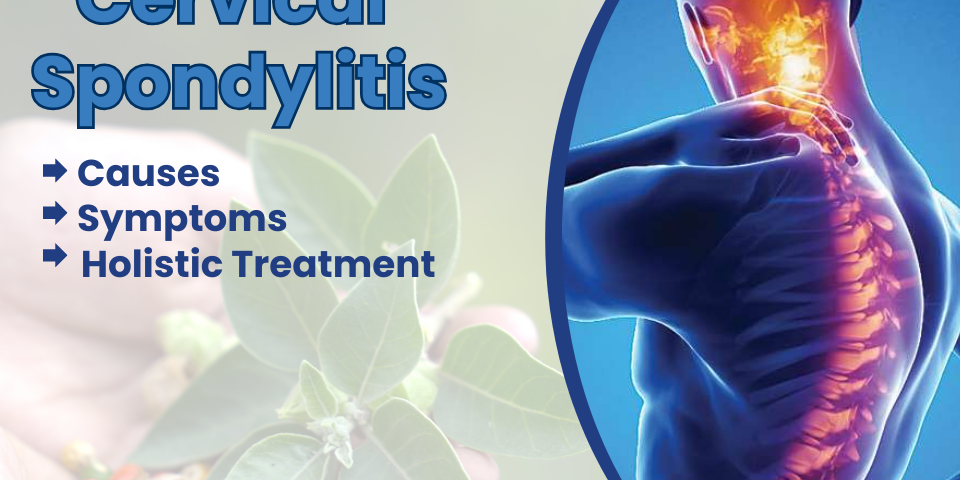Cervical Spondylitis

A Prameya News7 talk show on Low Backpain Ayurvedic Treatment
May 20, 2022
Madhumeha (Diabetes) in Ayurveda
September 24, 2024An Ayurvedic Perspective on Causes, Symptoms, and Holistic Treatment Options
Cervical spondylitis, known in Ayurveda as “Griva Sandhigata Vata,” is a degenerative condition of the cervical spine, leading to pain, stiffness, and discomfort in the neck. This condition is particularly prevalent in today’s fast-paced lifestyle, characterized by prolonged sitting, poor posture, and stress. From an Ayurvedic perspective, cervical spondylitis is primarily a Vata disorder, exacerbated by imbalances in the body’s doshas. This article delves into the Ayurvedic understanding of cervical spondylitis, exploring its causes, symptoms, and holistic treatment options offered by Ayurveda.
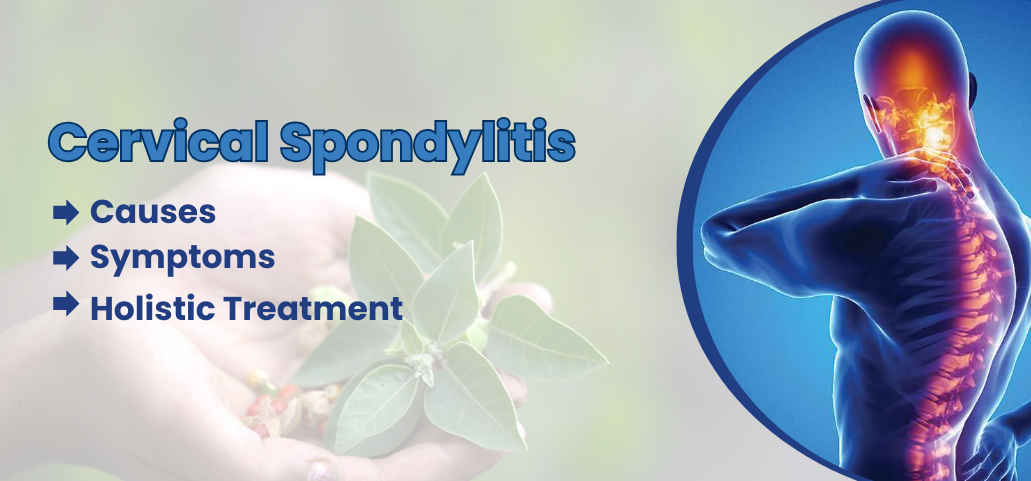
Ayurvedic Understanding of Cervical Spondylitis
In Ayurveda, the human body is governed by three fundamental energies or doshas: Vata, Pitta, and Kapha. Vata dosha, which controls movement and nerve impulses, plays a crucial role in the health of the joints and spine. When Vata is aggravated, it leads to dryness, stiffness, and degeneration in the body tissues, including the cervical spine. This imbalance can result in the development of cervical spondylitis.
Causes of Cervical Spondylitis According to Ayurveda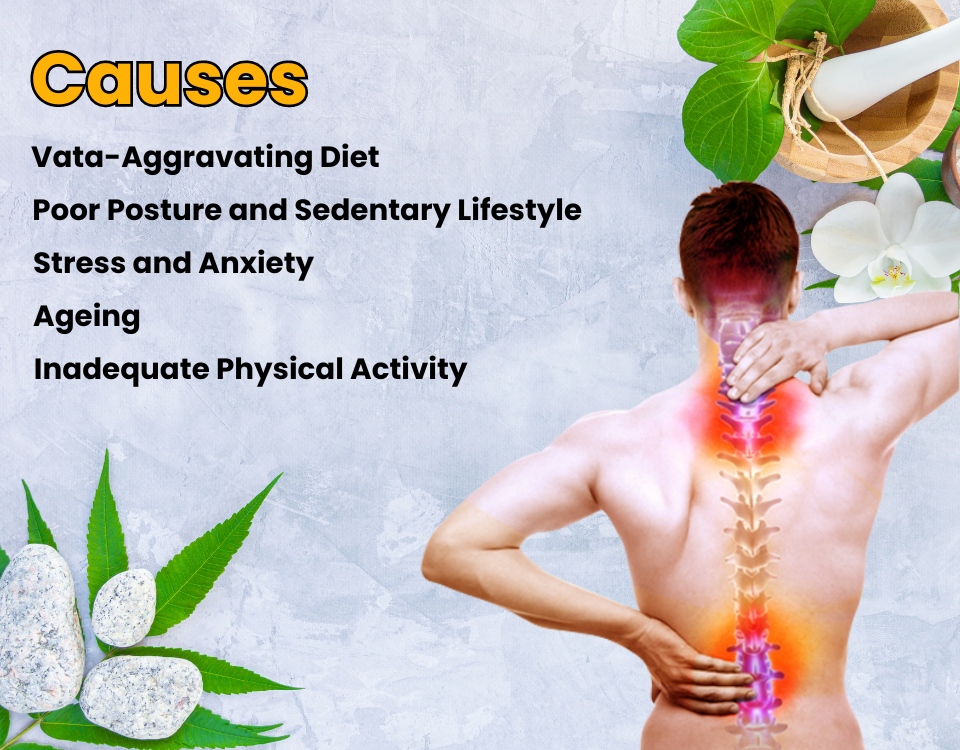
The causes of cervical spondylitis in Ayurveda are linked to lifestyle, diet, and mental health, all of which can disturb the Vata dosha. Key factors include:
- Vata-Aggravating Diet: Consuming dry, cold, and stale foods can increase Vata, leading to joint stiffness and degeneration. Food with bitter taste may worsen the pain.
- Poor Posture and Sedentary Lifestyle: Long hours of sitting, especially with poor posture, disrupt the natural alignment of the spine, aggravating Vata.
- Stress and Anxiety: Mental stress and anxiety can elevate Vata dosha, leading to muscular tension and neck pain.
- Ageing: As the body ages, the Vata dosha naturally increases, making older adults more susceptible to degenerative conditions like cervical spondylitis.
- Inadequate Physical Activity: Lack of regular exercise leads to poor circulation and stiffness, contributing to Vata imbalance and the onset of spondylitis.
Symptoms of Cervical Spondylitis from an Ayurvedic Perspective
The symptoms of cervical spondylitis are manifestations of aggravated Vata dosha, affecting both the physical and mental well-being of an individual. Common symptoms include:
- Neck Pain and Stiffness: Persistent pain in the neck, often radiating to the shoulders and arms, is a hallmark of cervical spondylitis.
- Restricted Mobility: Difficulty in moving the neck, especially during activities like driving or working at a computer.
- Headaches: Tension headaches originating from the neck region, commonly known as cervicogenic headaches.
- Tingling and Numbness: Vata imbalance can lead to neurological symptoms like tingling, numbness, or weakness in the arms and hands.
- Dizziness and Vertigo: Due to compression of the spinal nerves or arteries, some individuals may experience dizziness or vertigo.
Ayurvedic Approach to Treating Cervical Spondylitis
Ayurveda offers a holistic approach to managing cervical spondylitis, focusing on balancing the Vata dosha, improving joint health, and enhancing overall well-being. The treatment involves a combination of dietary changes, herbal remedies, Panchakarma therapies, and lifestyle modifications.
Dietary Recommendations
Diet plays a crucial role in balancing Vata dosha and supporting the health of the cervical spine. Ayurveda recommends:
- Warm, Nourishing Foods: Incorporate warm, cooked meals that are easy to digest. Soups, stews, and khichdi are ideal.
- Ghee and Oils: Use ghee (clarified butter) and oils like sesame oil to nourish and lubricate the joints.
- Avoid Vata-Aggravating Foods: Reduce the intake of dry, cold, and raw foods. Avoid caffeinated beverages, processed foods, and cold drinks.
- Herbs and Spices: Incorporate warming herbs and spices like ginger, turmeric, ashwagandha, and black pepper to reduce inflammation and improve circulation.
Herbal Remedies
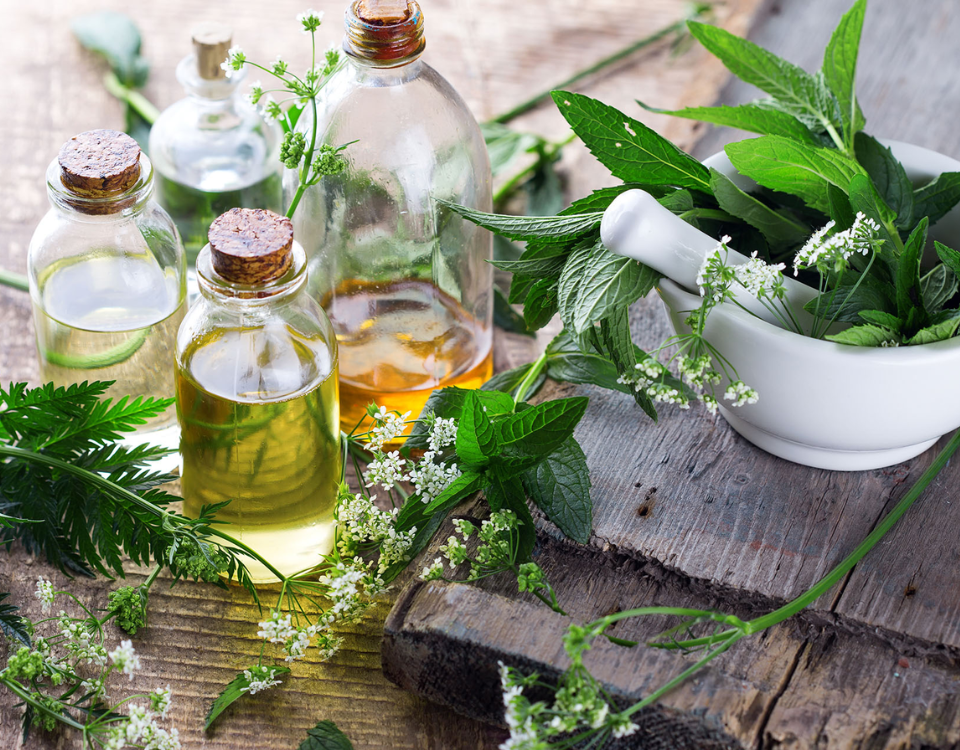 Ayurveda utilizes the power of herbs to restore balance to the body and alleviate symptoms of cervical spondylitis:
Ayurveda utilizes the power of herbs to restore balance to the body and alleviate symptoms of cervical spondylitis:
- Shallaki (Boswellia Serrata): Known for its anti-inflammatory properties, Shallaki helps reduce pain and swelling in the cervical spine.
- Guggulu (Commiphora Mukul): An effective herb for joint health, Guggulu helps in reducing inflammation and promoting joint mobility.
- Ashwagandha (Withania Somnifera): A rejuvenating herb that strengthens the nervous system and helps in managing stress, thereby reducing Vata imbalance.
- Rasna (Pluchea Lanceolata): Known for its Vata-pacifying properties, Rasna helps in relieving pain and stiffness associated with cervical spondylitis.
Panchakarma Therapies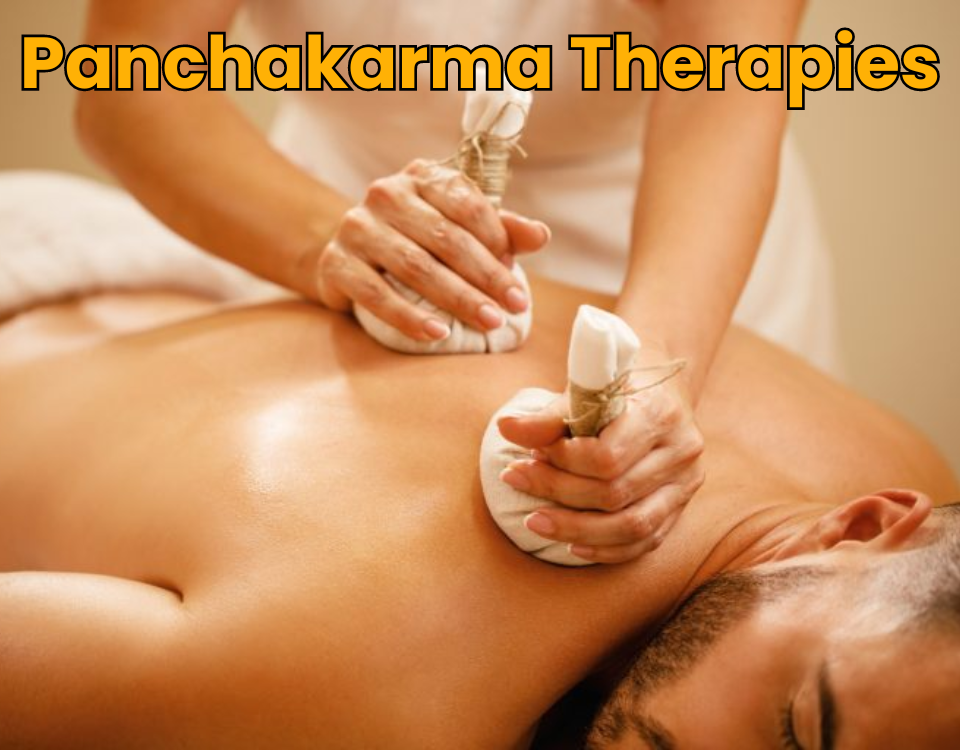
Panchakarma is a set of Ayurvedic detoxification therapies designed to cleanse the body of toxins and restore dosha balance. Specific Panchakarma treatments beneficial for cervical spondylitis include:
- Abhyanga (Oil Massage): A full-body massage using warm, medicated oils that pacify Vata and improve circulation. It relieves muscle tension and promotes flexibility.
- Swedana (Herbal Steam Therapy): This therapy involves sweating through herbal steam, which helps in relieving stiffness and pain in the cervical region.
- Nasya (Nasal Administration of Medicated Oils): Nasya involves administering medicated oils or herbal powders through the nostrils, which helps in relieving headaches, neck pain, and stiffness.
- Griva Basti (Warm Oil Therapy): A localized treatment where a dam made of dough is placed on the affected area and filled with warm medicated oil. This therapy is highly effective in relieving pain and inflammation in the cervical spine.
Lifestyle Modifications
Ayurveda emphasizes the importance of a balanced lifestyle to manage and prevent cervical spondylitis. Key recommendations include:
- Regular Exercise: Engage in gentle exercises like yoga and stretching to improve flexibility and strengthen the neck muscles. Specific yoga asanas beneficial for cervical spondylitis include Bhujangasana (Cobra Pose), Marjariasana (Cat-Cow Pose), and Shavasana (Corpse Pose).
- Correct Posture: Maintain good posture while sitting, standing, and sleeping. Use ergonomic furniture to support the natural curve of the spine.
- Stress Management: Practice mindfulness, meditation, and Pranayama (breathing exercises) to reduce stress and anxiety, which can aggravate Vata dosha.
- Adequate Rest: Ensure you get enough sleep and rest to allow the body to heal and rejuvenate. Avoid overexertion and take breaks during prolonged sitting or standing.
External Applications
Ayurveda also recommends the use of external applications to provide relief from pain and stiffness:
- Herbal Poultices (Upanaha): Applying warm poultices made from herbs like turmeric, ginger, and mustard seeds can help in reducing pain and inflammation.
- Medicated Oils: External application of medicated oils like Mahanarayan oil, Bala oil, and Dhanwantharam oil can provide relief from pain and stiffness in the neck region.
Call to Action
At Astang Ayurveda, we believe in treating the root cause of ailments rather than just the symptoms. Our team of experienced Ayurvedic practitioners offers personalized treatment plans for cervical spondylitis, combining the best of ancient wisdom and modern science. If you’re struggling with neck pain or any other symptoms of cervical spondylitis, don’t wait—take the first step towards holistic healing today.
Contact us at Astang Ayurveda to schedule a consultation and begin your journey to a pain-free, balanced life. Let Ayurveda guide you to optimal health and well-being.
Frequently Asked Questions (FAQs)
1. What is cervical spondylitis, and how does Ayurveda view it?
Cervical spondylitis, also known as cervical spondylosis, is a degenerative condition affecting the cervical spine, leading to neck pain, stiffness, and other neurological symptoms. In Ayurveda, it is viewed as a Vata disorder, where an imbalance of the Vata dosha leads to the degeneration of the cervical joints and surrounding tissues. Astang Ayurveda offers specialized treatments rooted in Ayurvedic principles to address these imbalances and restore spinal health.
2. What are the primary causes of cervical spondylitis according to Ayurveda?
Ayurveda attributes cervical spondylitis to several factors, including an imbalanced diet that aggravates Vata dosha, poor posture, sedentary lifestyle, stress, and the natural aging process. These factors lead to dryness, stiffness, and degeneration in the cervical spine. Astang Ayurveda provides personalized assessments to identify and address these underlying causes in each patient.
3. How can Ayurveda help in managing cervical spondylitis?
Ayurveda offers a holistic approach to managing cervical spondylitis, including dietary recommendations, herbal remedies, Panchakarma therapies, lifestyle modifications, and external applications. These treatments aim to balance the Vata dosha, reduce inflammation, and restore joint health. At Astang Ayurveda, we combine these traditional practices with modern diagnostic techniques to ensure comprehensive care.
4. Which Ayurvedic herbs are effective in treating cervical spondylitis?
Several Ayurvedic herbs are beneficial in treating cervical spondylitis, including Shallaki (Boswellia Serrata), Guggulu (Commiphora Mukul), Ashwagandha (Withania Somnifera), and Rasna (Pluchea Lanceolata). These herbs help in reducing inflammation, relieving pain, and strengthening the cervical spine. Astang Ayurveda offers these herbal remedies as part of a tailored treatment plan based on individual patient needs.
5. What Panchakarma therapies are recommended for cervical spondylitis?
Panchakarma therapies such as Abhyanga (oil massage), Swedana (herbal steam therapy), Nasya (nasal administration of medicated oils), and Griva Basti (warm oil therapy) are highly recommended for managing cervical spondylitis. For immediate pain relief Agni karma and Viddha Karma are highly effective. This treatment is highly impulsive and needs no medicine to give a quick relief.These therapies help in detoxifying the body, reducing Vata imbalance, and relieving pain and stiffness. Astang Ayurveda specializes in these Panchakarma treatments, providing a serene and healing environment for patients.
Astang Ayurveda provides both service both at out patient department (OPD) and in patient department (IPD) with boarding and fooding.
6. How can I prevent cervical spondylitis from worsening?
To prevent cervical spondylitis from worsening, Ayurveda recommends maintaining a balanced diet, engaging in regular exercise, practicing good posture, managing stress, and avoiding Vata-aggravating activities. Astang Ayurveda provides ongoing support and guidance to help you adopt these lifestyle changes and maintain spinal health.
7. How can I get started with treatment at Astang Ayurveda?
If you are experiencing symptoms of cervical spondylitis and are interested in Ayurvedic treatment, you can contact Astang Ayurveda to schedule a consultation. Our experienced practitioners will conduct a thorough assessment and design a personalized treatment plan tailored to your specific needs.

